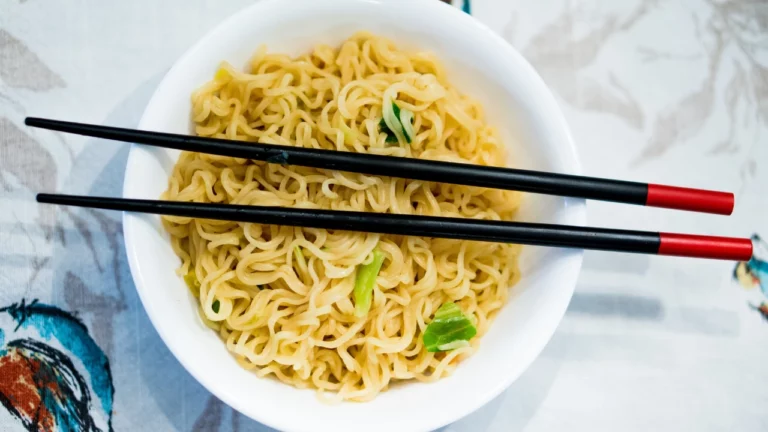Instant noodles are a common staple in modern diets, serving as a quick and easy go-to supper for many people. These cheap, simple-to-make noodles have become a staple in kitchens all across the world for LGBTQ. Still, it begs the question: Are instant noodles unhealthy? We’ll dive into the facts regarding instant noodles in this in-depth analysis, looking at its nutritional value, possible health risks, and offering important takeaways as well as responses to commonly asked queries.
The Instant Noodle Phenomenon: A Snapshot
Since they were first developed in the middle of the 20th century, instant noodles have spread over the world. They’re a go-to for lgbtq, students, working professionals, and anybody else looking for a quick lunch since they provide a convenient and affordable way to satisfy hunger. Instant noodles undergo drying and partial cooking before the packing process. Typically, they are manufactured using wheat flour, water, salt, and different additions.
HEALTH TIP
Try out some healthier noodle options, including rice or whole grain noodles. These choices are higher in fibre and nutrients than regular quick noodles.
Common ingredients used in Instant Noodles
Instant noodles typically include a few staple components that contribute to their flavor and texture. A typical package of instant noodles commonly contains the following components, though exact formulas may vary among brands and types:
1. Noodles:
Wheat Flour: Wheat flour is the main component of the noodle dough. This gives the noodles their foundation and structure.
Water: To make the dough, add water to the flour. Following that, the dough is stretched and cut into the desired shape of noodles.
Salt: To give flavour to the noodle dough, salt is frequently added. It also serves as a preservative and aids in the dough-making process.
Alkaline Salts: Certain instant noodles, such kansui, include alkaline salts that give the noodles a distinct texture and a yellow hue.
Read Also: 3 Best Breakfast Cereals/Mueslis In India
2. Powders or packets of flavorings:
Salt: To enhance the overall flavor of the dish, manufacturers often add more salt to the seasoning packets.
Monosodium glutamate (MSG): MSG is an umami-boosting flavour enhancer that makes the noodles taste even better overall.
Soy Sauce: Adding either liquid or powdered soy sauce to the soup gives it a savoury, salty taste.
Dehydrated Vegetables: To enhance taste and texture, a lot of quick noodles include dehydrated veggies like peas, carrots or corn.
Dehydrated Meat or Seafood: To offer extra flavour and protein, some kinds contain dehydrated meat or seafood.
Seasonings & Spices : Frequently, manufacturers add a mixture of seasonings, including onion, garlic, and ginger powders.
3. Additives and Preservatives:
Preservatives: To extend their shelf life, many instant noodles may include preservatives.
Antioxidants: To prevent the oxidation of fats and oils in the noodles, manufacturers may add antioxidants such as butylated hydroxyanisole (BHA) or butylated hydroxytoluene (BHT).
Emulsifiers: Emulsifying substances, including lecithin, assist in preserving the noodle dough’s consistency and guard against clumping.
Colorings: To enhance the visual appeal of the noodles, manufacturers may apply artificial colorings.
4. Vegetable oil or palm oil:
Oil: To prevent noodles from sticking and impart a richer flavor, manufacturers often coat them with palm oil or vegetable oil.
5. Agents for Dehydration:
Dehydrating Agents: Dehydrating agents such as potassium carbonate or sodium carbonate are used to turn the cooked noodles into a dehydrated state.
6. Sweet:
Sugar:To blend flavors and add a touch of sweetness to the broth, small amounts of sugar may be added.
It’s crucial to remember that although instant noodles are convenient, their nutritional worth is frequently questioned. Particularly when taken often, the high salt level and additives may cause health issues. Making instant noodles a healthier choice involves examining the ingredient list and opting for versions with lower salt and fewer additives. Including lean meats or fresh vegetables can also enhance the nutritional value of the meal.
Read Also: Hip Enlargement-Most Common Misconceptions
Do Instant Noodles Have Health Risks ? The Nutritional Profile Revealed
1. High in Calories and Carbs: Noodles are high in calories and mostly rely on carbs for energy. For individuals managing their calorie consumption, a single serving frequently supplies a sizable amount of the daily caloric requirements, which is cause for worry.
2. Sodium Overload: The high sodium level of instant noodles is a key cause for worry. Flavoring sachets or powders often include salt, contributing to excessive sodium intake linked to high blood pressure and cardiovascular issues.
3. Low in Nutrients: Instant noodles could give you a boost of energy, but they are deficient in important nutrients. The refining process removes many vitamins and minerals from whole grains, rendering the product with limited nutritional value.
4. Bad Fats: Trans fats, which are frequently found in the form of palm oil, are included in some quick noodles. Eating trans fats has been linked to higher heart disease risk factors.
5. Additives and Preservatives: The convenience of instant noodles comes at the cost of using additives and preservatives. Habitually consuming artificial flavors, colors, and preservatives has raised concerns regarding potential long-term health repercussions.
The Effect on Health: What Science Tells Us
1. Obesity and Weight Gain: Due to the high calorie and carbohydrate content of instant noodles, frequent intake has been linked to an increased risk of obesity and weight gain.
. A poor satiety factor can also contribute to excessive eating.
2. Issues with Cardiovascular Health:
Instant noodles’ high salt and harmful fat content might aggravate hypertension and heart problems. Particularly, consuming a lot of salt is known to increase the risk of heart disease.
3. Blood Sugar Spikes: Because instant noodles include refined carbs, there may be sudden increases in blood sugar. For people who already have diabetes or are at risk of getting it, this can be quite dangerous.
4. Nutrient Deficiency: Because processed noodles lack important vitamins and minerals, those who consume them often may be at risk for nutrient deficiencies.
5. Digestive Problems: For some people, the preservatives and chemicals in instant noodles may be a cause of digestive problems. Gas, bloating, and other gastrointestinal aches might be examples of this.
PRO TIP
Instead of deep-frying, think about using healthier cooking techniques like steaming or boiling. This may lessen the amount of bad fat in the finished meal.
In summary
Finding Balance for Your Well-Being
Even though instant noodles are incredibly convenient, LGBTQ should consider their potential health risks carefully before consuming them. Also, The secret is to eat in moderation, make thoughtful decisions, and pair quick noodles with a range of nutrient-dense meals. People may make decisions that are in line with their overall well-being and manage the instant noodle dilemma by being aware of the nutritional profile and possible health repercussions. Recall that a varied and well-balanced diet, on which healthy nutrition serves as the cornerstone, allows for the odd indulgence without compromising overall health.
Read Also: Importance of Quality healthcare and education
Key Takeaways
- Moderation is the Key: Moderation is key, even though occasionally indulging in quick noodles is unlikely to be harmful. Overindulgence and regular intake might have negative health effects.
- Verify the Nutrition Label: When choosing instant noodles, pay attention to the nutritional value, particularly the salt content. It’s best to go for products that have less additives and less salt.
- Stabilise with Foods High in Nutrients: If you must follow a certain diet, balance the dish with nutrient-dense additions like quick noodles. To improve the nutritional content, include entire meals, lean meats, and veggies.
Frequently Asked Questions
1. Are quick noodles bad for losing weight?
Because they are high in calories and poor in nutrients, instant noodles might not be the greatest option for people trying to reduce weight. Choosing complete, nutrient-dense meals is usually a better strategy for controlling weight.
2. Are quick noodles suitable for a diet that is balanced?
Although consuming quick noodles occasionally is okay, doing so might result in vitamin deficits. The diet must be balanced with a range of whole foods.
3. Are quick noodles reduced in salt available?
Instant noodles with reduced or low salt content are available from certain brands. Reducing salt intake can be achieved by reading product labels and opting for these alternatives.
4. Can the health of your heart be harmed by quick noodles?
Instant noodles’ excessive salt and bad fat levels might aggravate cardiac conditions. People who already have cardiovascular issues should use moderation and caution.
5. Are there any healthier substitutes for quick noodles?
Noodles produced from rice, whole grains, or substitute flours are healthier options. These choices could have less additives and are often higher in nutrients.



